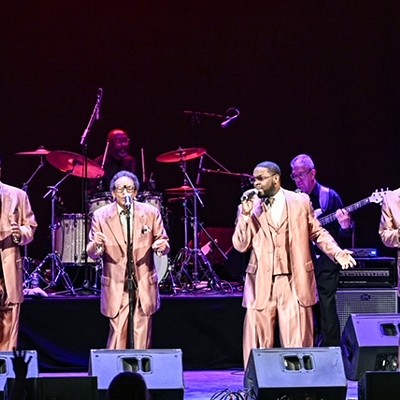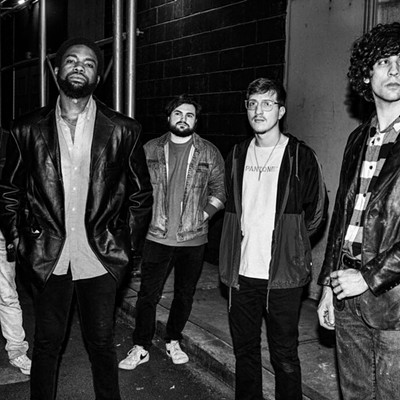Ann Arbor Film Festival Tour
As one among just a handful of traveling sideshows of new short films that reach Pittsburgh each year, the venerable Ann Arbor Film Festival Tour is always worth your while. And if a preview videotape sampling roughly half this year's offerings is any indication, the 41st annual edition is one of the strongest in recent memory.
The touring fest is divided into two programs of roughly two hours each; as with any festival, there's a sprinkling of the self-indulgent or disappointingly pedestrian. But there's more than enough quality film to focus upon, starting in Program 1 with Ted Gesing's hilarious documentary Nutria, about the cat-sized semi-aquatic rodent that's a case study in fur farming gone awry. Because the voracious herbivores are destroying Louisiana's wetlands, they're used for target practice -- but they also show up as minor-league sports mascots and in nouveau cuisine.
Program 1 also includes The Good Son, Michael Sandoval's incisively photographed documentary about a young Filipino-American whose obsession with martial arts puts him at odds with his father, an evangelical Christian minister. In Downpour Resurfacing, filmmaker Frances Nkara impressionistically uses found footage, dancers and a Japanese tea ceremony to help a man named Robert Hall tell of the abuse he suffered in childhood and how he copes with it; at 28 minutes, it's a bit repetitive, but thoughtful and ultimately moving. Another highlight is Diane Bonder's Closer to Heaven, an experimental film that's a remarkable elegy for her elderly father. Unavailable for preview was Ultima Thule, a new work by talented animator Janie Geiser.
Highlights of Program 2 include the handmade, elegantly funky and reggae-scored cell animation Rude Roll, by Rick Raxlen; Twirl Girl, Trish Van Huesen's weirdly hypnotic mix of found footage, animation and other techniques; and Rebecca Meyers' Glow in the Dark (January-June), a puzzling and unsettlingly beautiful essay on the manifestations of light at nighttime, in all kinds of weather. The New Patriots, though formally conventional, is politically bracing: Robert Richter's 18-minute documentary profiles military veterans, including a Congressional Medal of Honor recipient, who now question their government. "It is the height of patriotism to express my distress with U.S. foreign policy," says one.
The most visually striking Program 2 piece might be Percy Fuentes' Sand, which hybridizes sand animation and computer manipulation to poetically evoke a series of vignettes from an urban neighborhood. Intriguing, but not available for preview, is Deborah Stratman's 33-minute In Order Not to Be Here, which claims to "confront ... the hermetic nature of white-collar communities, dissecting the fear behind contemporary suburban design."
Bonus: As part of the Allegheny Regional Assset District's "RADical Weekend," all screenings of this smartly curated festival are free.
The touring fest is divided into two programs of roughly two hours each; as with any festival, there's a sprinkling of the self-indulgent or disappointingly pedestrian. But there's more than enough quality film to focus upon, starting in Program 1 with Ted Gesing's hilarious documentary Nutria, about the cat-sized semi-aquatic rodent that's a case study in fur farming gone awry. Because the voracious herbivores are destroying Louisiana's wetlands, they're used for target practice -- but they also show up as minor-league sports mascots and in nouveau cuisine.
Program 1 also includes The Good Son, Michael Sandoval's incisively photographed documentary about a young Filipino-American whose obsession with martial arts puts him at odds with his father, an evangelical Christian minister. In Downpour Resurfacing, filmmaker Frances Nkara impressionistically uses found footage, dancers and a Japanese tea ceremony to help a man named Robert Hall tell of the abuse he suffered in childhood and how he copes with it; at 28 minutes, it's a bit repetitive, but thoughtful and ultimately moving. Another highlight is Diane Bonder's Closer to Heaven, an experimental film that's a remarkable elegy for her elderly father. Unavailable for preview was Ultima Thule, a new work by talented animator Janie Geiser.
Highlights of Program 2 include the handmade, elegantly funky and reggae-scored cell animation Rude Roll, by Rick Raxlen; Twirl Girl, Trish Van Huesen's weirdly hypnotic mix of found footage, animation and other techniques; and Rebecca Meyers' Glow in the Dark (January-June), a puzzling and unsettlingly beautiful essay on the manifestations of light at nighttime, in all kinds of weather. The New Patriots, though formally conventional, is politically bracing: Robert Richter's 18-minute documentary profiles military veterans, including a Congressional Medal of Honor recipient, who now question their government. "It is the height of patriotism to express my distress with U.S. foreign policy," says one.
The most visually striking Program 2 piece might be Percy Fuentes' Sand, which hybridizes sand animation and computer manipulation to poetically evoke a series of vignettes from an urban neighborhood. Intriguing, but not available for preview, is Deborah Stratman's 33-minute In Order Not to Be Here, which claims to "confront ... the hermetic nature of white-collar communities, dissecting the fear behind contemporary suburban design."
Bonus: As part of the Allegheny Regional Assset District's "RADical Weekend," all screenings of this smartly curated festival are free.














